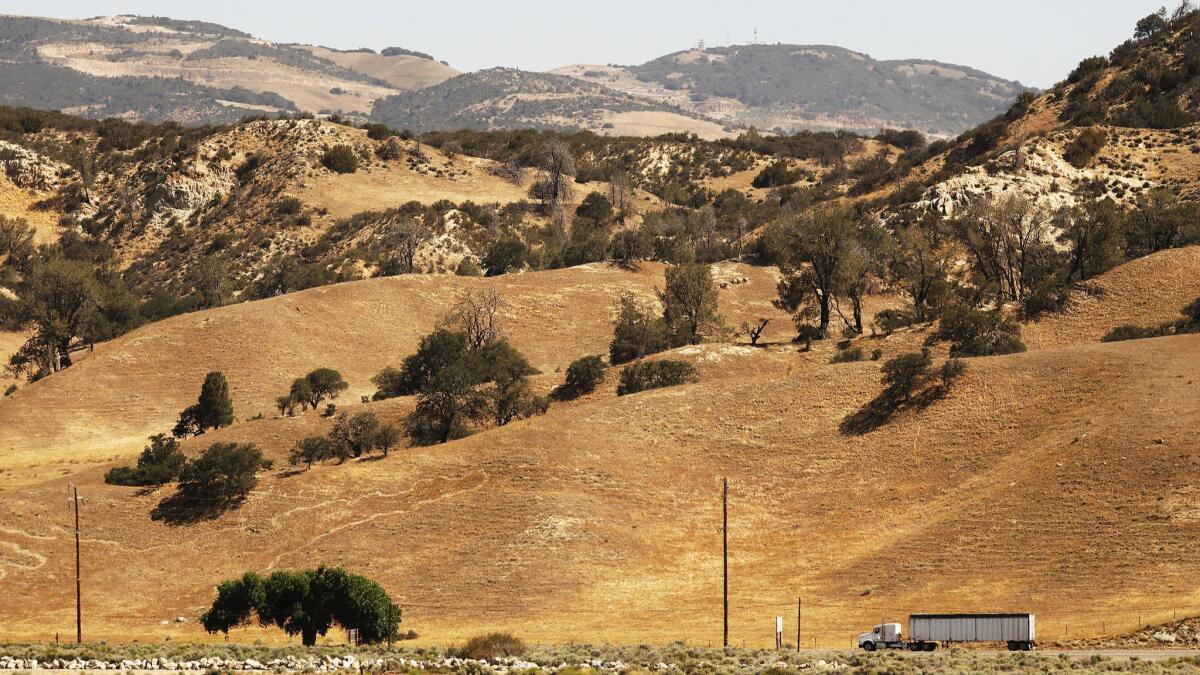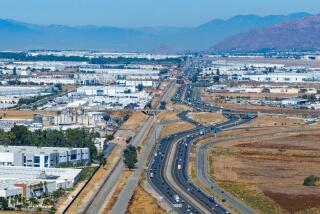L.A. County inches toward a final decision on Tejon Ranch development

The development of a long-discussed planned community in northern Los Angeles County faced renewed debate Wednesday at a public hearing of the Regional Planning Commission.
The Centennial development, a proposed 12,000-acre community on the Tejon Ranch near Gorman, would include nearly 20,000 homes and 10 million square feet of commercial, retail and âinstitutional/civicâ space for public facilities like schools, parks, a sheriffâs station and an urgent care clinic. Nearly half of the site would be open space.
Some environmental advocates and residents who oppose the project say it will ruin the habitats of protected species and contribute to sprawl that increases the regionâs car dependence, worsening air quality and generating more greenhouse gases.
Tejon Ranch Co., the developer, says Centennial will provide badly needed housing and economic growth while preserving the local environment.
âThis project, a concentrated urban development of balanced uses, is part of the solution to Californiaâs climate leadership while meeting housing needs,â Jennifer Hernandez, the attorney representing Tejon Ranch on the Centennial development, said at the planning hearing.
The proposed development would sit on Tejon Ranch, a 270,000-acre private property near the top of the Grapevine.
Established 175 years ago through a land grant, the area includes grasslands, oak woodlands and desert and is home to a number of rare species, including California condors, San Joaquin kit foxes and bald eagles.
In 1999 Tejon Ranch Co. began planning three new developments on the land, including Centennial. Ten years ago, it reached a landmark agreement with environmental groups to conserve 90% of the property, or 240,000 acres.
âToday we begin the final process of that historic agreement,â Greg Medeiros, vice president of community development for Tejon Ranch Co., said Wednesday.
Roughly 40 people spoke at the hearing, including a handful who gave testimony remotely from Lancaster.
Those in support, including representatives from chambers of commerce, developers, construction companies and local residents, spoke of the jobs, income, housing and services it would bring to a remote, unincorporated part of L.A. County.
âFor 25 years Iâve watched Tejon Ranch invest in our local communities. I have been eagerly awaiting the benefits that it is bound to bring,â said Candace Huskey-Brown, citing jobs, healthcare facilities and retail.
âWe pay taxes just like everybody else and we donât have access to the parks, the libraries, the schools,â said Lisa Ballentine, a longtime resident of Neenach, an agricultural community of about 800 people near Centennial.
Ballentine described putting her children on a bus at 5:30 in the morning to get them to faraway schools. She also said that her husband, a firefighter, has become a default emergency responder of sorts.
âOur local deputy gets off at 6. At 6:01 youâre on your own,â she said in an interview.
Opponents wearing red âStop Centennialâ labels raised concerns about impacts to native species, traffic congestion, air quality, climate change and water resources.
J.P. Rose, a staff attorney for the Center for Biological Diversity, which did not sign on to the 2008 preservation agreement with Tejon, described Centennial as the âwrong vision for L.A. County.â
âNinety-nine percent of California native grasslands are already gone forever. I ask you not to put the final nail in the coffin,â Rose said.
His group has also said the projectâs location in high fire hazard severity zones and atop two earthquake fault lines make it unsuitable for development.
Bryn Lindblad, associate director of the nonprofit group Climate Resolve, urged the planning commission to consider scrapping the project altogether, noting it provides no access to mass transit.
âTransportation is the biggest contributor to greenhouse gases,â she said. âStopping a project like this is what we can do to make good on our climate goals.â
Several commissioners raised questions about access to mass transit, as well as water usage, set-aside units for seniors and low-income families, plans to address homelessness, local jobs, and the possibility of reconfiguring the project as a ânet-zeroâ contributor to greenhouse gases.
The commission voted to take up the issue July 11. If it votes at that time to recommend approval of the developerâs plan, the project will go to the L.A. County Board of Supervisors for final consideration.
Twitter: @AgrawalNina
More to Read
Sign up for Essential California
The most important California stories and recommendations in your inbox every morning.
You may occasionally receive promotional content from the Los Angeles Times.











